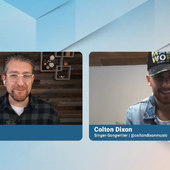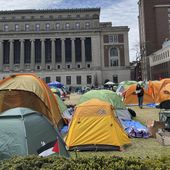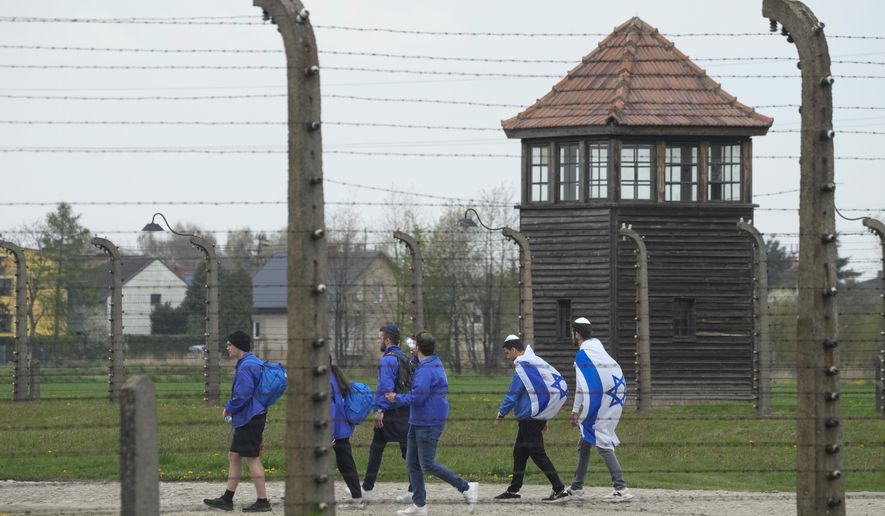OPINION:
“One night, it was Friday night, there was a knock on our door. Soldiers came in…”
Sarah begins, her voice a bridge across time. I hesitated to ask if she referred to the Shabbat when Nazi soldiers shattered her childhood over 80 years ago in Eastern Europe, or the Shabbat just six months ago, when the terrorists who invaded southern Israel brought her face-to-face with her past, only to be miraculously rescued by Israeli soldiers.
Sarah is a Jewish Holocaust survivor who, at 88 years old, is once again a refugee. She has been living in a tiny hotel since October 7, 2023, when she was evacuated from her kibbutz home in the Holy Land.
Subscribe to have The Washington Times’ Higher Ground delivered to your inbox every Sunday.
“Life in Israel is a dream,” Sarah said, pointing out the window to our stunning view of Jerusalem. Even as a refugee, Sarah doesn’t complain. She realizes what it means to have a homeland, to have a home. “I would rather be a refugee in Israel than live anywhere else in the world,” she told me confidently.
Then, through tears, Sarah shared with me her family’s story of escape from the Nazis. From their comfortable home in Poland, to a labor camp in Siberia, and after the war, to a new life in the Holy Land.
Life hasn’t been easy for Sarah, but she puts it in perspective, again and again thanking God for simply being alive. Unlike the 6 million Jews who were murdered during the Holocaust — 6 million people whose lives and stories we vow to “Never Forget” — Sarah and her family were some of the few Polish Jews who not only survived the Holocaust, but who got a second chance at life, in Israel.
Like so many survivors, Sarah not only forged a life and family of her own in the Promised Land, she dedicated her life to rebuilding the modern Jewish state of Israel, which she sees as the culmination of the dream of her family members who perished in the gas chambers of Eastern Europe. For Sarah, Israel is not only the return to the Jewish people’s biblical homeland, but the return to a place where the Jewish people can finally — after more than 2,000 years of exile and persecution – live and worship freely.
For generations, Sarah’s family felt safe in Poland. They never dreamed such an atrocity could happen in modern and developed Europe. In this shadow of the Holocaust, it’s not lost on any Holocaust survivor that Israel is the only country that not only says, “Never Again,” but has an army to back that up in action, if need be. And that is why, despite the terror through which Sarah has too often lived in southern Israel, she always felt safe in her home and community. But all of that changed on October 7, 2023.
“I was by myself, at home. I hear a red alert. Some people came into my house. There was a lot of bombing outside…”
When those red alert sirens sounded that morning on the kibbutz in southern Israel where this precious elderly woman has made her life and home, Sarah wasn’t initially startled. In this area, so close to Israel’s border with Gaza, rocket sirens sometimes sound — and terrorist rockets sometimes fall. But Israel is a nation of survivors, of strong people who have lived through so much. And Sarah is one of them. So she didn’t worry, at first.
SEE ALSO: WATCH: Holocaust survivor shares story of survival, warns against dangers of antisemitism
Going outside to see what was happening, Sarah checked her sukkah — Sukkot, the biblical Festival of Tabernacles, had ended just the night before — and was startled when complete strangers barged into her home in a panic.
But these strangers weren’t Nazis, like in Sarah’s childhood. And these weren’t terrorists, praise God. These were other Israelis — throngs of panicked and traumatized young people fleeing the Hamas massacre already being carried out at the Nova Festival, being held just a few minutes from Sarah’s home.
“They were yelling for everyone to get into my house,” Sarah said. “They locked the door, and put a very big armchair in front of it. And we all went into the shelter.”
Praise God, Sarah and the young Israelis sheltering in her home throughout the attacks all survived. But more than six months later, Sarah is once again a refugee, still displaced, unable to return to her dream life on the kibbutz — a life of community, agriculture, and tradition, which she built from the ashes of the Holocaust. Instead, she’s living out of a suitcase in a room that’s not her own, an internally displaced refugee in Israel. For the second time in her life, Sarah has miraculously survived, but has been driven from her home by hatred and violence, simply because she is Jewish.
The Washington Times’ Higher Ground, in partnership with the International Fellowship of Christians and Jews, shared the incredible story of Jochen Wurfl. All of Jochen’s family, besides him and his brother, were killed in Nazi death camps because their mother was Jewish. Jochen and his brother miraculously survived the Holocaust because good and brave people stood up for what was right and helped them hide.
And my role as president and CEO of The Fellowship has given me the privilege of hearing so many survivors’ stories. From Holocaust survivors like Sarah and Jochen, who survived the darkest chapter of the 20th century, to survivors of the violence and terror facing Israel right now.
I have cried with survivors like the grandmother who hid in one kibbutz bomb shelter during the attacks, not knowing if her three precious granddaughters hiding in another shelter were still alive. Survivors like the farmer who works the land next to the Gaza border, who survived the attacks, and who is now back growing the food that feeds our nation. Survivors like the young woman who fled the Nova Festival — a celebration of peace and friendship — and hid from terrorists for hours in a bush in the desert, as three of her best friends were murdered, and another was kidnapped to Gaza.
The Jewish people are survivors. Our strength gives me hope. And for nearly 80 years, the free world has pledged to “Never Forget” the Holocaust, vowing that genocide against the Jews will “Never Again” happen on our watch. But for Sarah, for Jochen, and for every one of us here in Israel — the farmers, the grandmothers, the young people — it has happened again.
As the granddaughter and daughter-in-law of Holocaust survivors from Germany and Poland, this International Holocaust Remembrance Day, I have one burning question: How can this be?
How can it be that even today, despite the dark lessons of history, Jews are once again being targeted for their faith? How can it be that anti-Semitism has spiraled out of control, not only here in the Holy Land, but in nearly every city around the world?
While I cannot answer the question of why this hatred of and violence against God’s people has once again reared its ugly head, any more than I can explain anti-Semitism throughout history, I do know that it’s not too late to do something about it.
It’s not too late to change the course of history. It’s not too late, for those who cherish freedom and value human life, to realize the repercussions of staying silent. It’s not too late to call out, in unity, “Never Again.”
And so, as we observe Yom HaShoah, or Israel‘s Holocaust Remembrance Day — as the Jewish people once again face an evil trying to annihilate us, as hundreds of millions of enemies vow to destroy the 7 million Jews here in Israel, as a new generation of Jewish survivors seemingly stands alone — let us come together in this moment of truth. In unity, let us yell out so loud that the terrorists in Iran hear our determination; that the kidnapped Israelis in the tunnels of Gaza hear our love; that God on high is shaken by our cry… “NEVER AGAIN!”
–
Yael Eckstein is president and CEO of The International Fellowship of Christians and Jews and oversees all programs and serves as the international spokesperson for the organization. With over a decade of nonprofit experience in multiple roles, Yael has the rare distinction of being a woman leading one of the world’s largest religious charitable organizations. In 2021, she launched her podcast, “Nourish Your Biblical Roots,” in which she shares spiritual insights and lessons from the Torah, and invites leading Christian and Jewish thought leaders to discuss Jewish-Christian relations and Israel’s significance on the world stage. She is the 2023 recipient of the Jerusalem Post’s Humanitarian Award, and in 2020, 2021 and 2023, was named to the publication’s list of 50 Most Influential Jews. Born outside of Chicago, Yael is based in Israel with her husband and their four children.
About International Fellowship of Christians and Jews (The Fellowship): For over 40 years, The Fellowship has been the leading nonprofit building bridges between Christians and Jews, blessing Israel and the Jewish people around the world with humanitarian care and lifesaving aid. The Fellowship helps over 1 million people living in poverty annually, and provides Holocaust survivors in Israel and throughout the former Soviet Union with basic necessities like food, medicine, and heat so they can live their lives with dignity and hope.




Please read our comment policy before commenting.